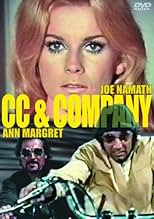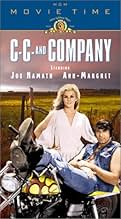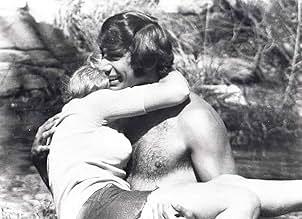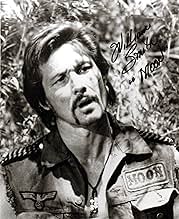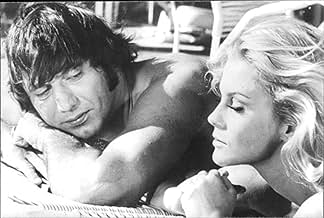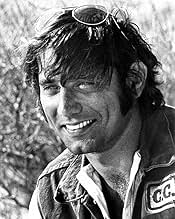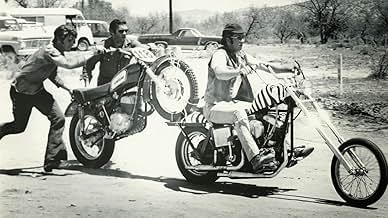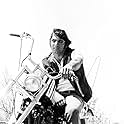IMDb रेटिंग
4.8/10
1.1 हज़ार
आपकी रेटिंग
अपनी भाषा में प्लॉट जोड़ेंA motorcycle rebel saves a woman from his gang and fights an outlaw guru for supremacy.A motorcycle rebel saves a woman from his gang and fights an outlaw guru for supremacy.A motorcycle rebel saves a woman from his gang and fights an outlaw guru for supremacy.
Jacquie Rohr
- Zit-Zit
- (as Jackie Rohr)
Bill Baldwin
- Night Watchman
- (as William Baldwin)
कहानी
क्या आपको पता है
- ट्रिवियाThe #12 given to Joe Namath ("CC") for the Moto X Race is the same number he wore on his jersey with the NY Jets.
- गूफ़In a scene where C.C. kicks starts his dirt bike you hear the engine rev-up but his hand never moves the throttle.
- भाव
Ann McCalley: How do you get along without working?
C.C. Ryder: Just fine.
Ann McCalley: [laughs] You steal from the rich to give to the poor?
C.C. Ryder: No, I steal from the rich 'cause the poor have no money.
- कनेक्शनFeatured in The Fabulous Allan Carr (2017)
- साउंडट्रैकToday
The Love Theme from C.C. & Company (1970)
by Lenny Stack and Janelle Webb (as Janelle Cohen)
Sung by Ann-Margret
फीचर्ड रिव्यू
As producers, Allen Carr and Roger Smith didn't know how to make movies but they did know how to market them. "C.C. and Company" (1970) was one of Smith's attempts to revive the acting and singing career of his wife Ann-Margret, whose American career had pretty much dried up in the mid-60's. So they looked around for a way to package the aging star in a vehicle they could profitably distribute.
They decided to capitalize of the huge popularity of the super bowl champion N.Y. Jets quarterback Broadway Joe Namath. If you were not around in 1969 you will have a hard time grasping the extent of Joe's popularity. At its peak he was probably the most popular sports figure of all time and he single-handedly transformed NFL viewing from a men's club to a mixed gender group. In "C.C. and Company" Joe doesn't act so much as just play his relaxed good- natured self in front of the camera. The film begins with its best sequence as Joe, playing an outlaw motorcycle club member named C. C. Ryder, is shown walking around inside a supermarket while casually assembling a sandwich from the various products on the shelves. After he eats the sandwich he helps himself to a Twinkie and a small carton of milk. Then he hits the checkout line with just a package of "Fruit Stripe" gum to pay for and exits the store. This might be film's only attempt at symbolism as the gas tank and rear fender of Joe's chopper are painted a zebra stripe pattern. Baby boomers may recall that "Fruit Stripe" gum commercials featured a zebra.
Carr and Smith (Smith also wrote the screenplay) chose to make an independent outlaw motorcycle picture, a sub-genre dominated by American International. While AI's films were normally distributed to drive-ins, Carr and Smith hoped to exploit the recent unexpected success of "Easy Rider"- a motorcycle movie that had played well in mainstream theaters. And this is just what they did with "C.C. and Company", using Avco Embassy to book the film into first-run theaters and into giving it extensive promotion. It would not play to drive-in audiences until 1971.
Joe delivers a lot of charm, some credible action sequences, and a scene where he actually exhibits some acting skill (or at least an awareness of the acting craft). This scene occurs early in the film when his club disrupts a moto-cross race. Joe is sitting on his bike watching the fun when he spots Ann looking on in shock. Joe wordlessly conveys a sudden embarrassment over the actions of his associates. The scene works, in part because of good editing, but also because Namath obviously understands the process.
The film was not a success for Ann-Margaret even though she gets to ride a mini-bike in one scene and sing a song ("Today" by Lenny Stack). She was a bit too old to keep playing the innocent girl who is also a sex kitten role, up till then her standard character. Without this to fall back on she seems lost trying to appear more sophisticated. In the looks-sexy department she is totally upstaged by biker chick Pom Pom-Jennifer Billingsley who I remember as the Driving Range attendant on an episode of "Ozzie and Harriet".
Upstaging everybody is William Smith (who played Texas Ranger Joe on the "Laredo" television show) as "Heads" leader Moon. Flexing his muscles, thanks to a sleeveless denim jacket, Smith pretty much steals the whole film. The seemingly virile Moon is a disappointment in the sack, which sets up a little action between Namath and Billingsley. The big fight between Smith and Namath is nicely staged but is really sold by frequent cut-away shots to the increasingly turned-on Pom Pom.
Also notable is Sid Haig who rides a traffic cop trike and wears a Mongol helmet. Lizard, the other trike rider, is "Mary Hartman's" Greg Mullavy, whose machine sports a toilet seat and the title "The Heads Head".
Largely forgotten now, at the time of its release "C.C. and Company" was a cultural icon. It was probably the most quoted 1970 film in schools and workplaces. The most immortal line being Moon's convoluted declaration to C.C. that: "We got the club here see and you are way over there". And just about everything that straight-arrow moto-cross racer Eddie Ellis (Don Chastain) said was an instant classic. "That's what gives motorcycling a bad name" and "You talking to me" (he said the line before Robert De Niro!).
Then again, what do I know? I'm only a child.
They decided to capitalize of the huge popularity of the super bowl champion N.Y. Jets quarterback Broadway Joe Namath. If you were not around in 1969 you will have a hard time grasping the extent of Joe's popularity. At its peak he was probably the most popular sports figure of all time and he single-handedly transformed NFL viewing from a men's club to a mixed gender group. In "C.C. and Company" Joe doesn't act so much as just play his relaxed good- natured self in front of the camera. The film begins with its best sequence as Joe, playing an outlaw motorcycle club member named C. C. Ryder, is shown walking around inside a supermarket while casually assembling a sandwich from the various products on the shelves. After he eats the sandwich he helps himself to a Twinkie and a small carton of milk. Then he hits the checkout line with just a package of "Fruit Stripe" gum to pay for and exits the store. This might be film's only attempt at symbolism as the gas tank and rear fender of Joe's chopper are painted a zebra stripe pattern. Baby boomers may recall that "Fruit Stripe" gum commercials featured a zebra.
Carr and Smith (Smith also wrote the screenplay) chose to make an independent outlaw motorcycle picture, a sub-genre dominated by American International. While AI's films were normally distributed to drive-ins, Carr and Smith hoped to exploit the recent unexpected success of "Easy Rider"- a motorcycle movie that had played well in mainstream theaters. And this is just what they did with "C.C. and Company", using Avco Embassy to book the film into first-run theaters and into giving it extensive promotion. It would not play to drive-in audiences until 1971.
Joe delivers a lot of charm, some credible action sequences, and a scene where he actually exhibits some acting skill (or at least an awareness of the acting craft). This scene occurs early in the film when his club disrupts a moto-cross race. Joe is sitting on his bike watching the fun when he spots Ann looking on in shock. Joe wordlessly conveys a sudden embarrassment over the actions of his associates. The scene works, in part because of good editing, but also because Namath obviously understands the process.
The film was not a success for Ann-Margaret even though she gets to ride a mini-bike in one scene and sing a song ("Today" by Lenny Stack). She was a bit too old to keep playing the innocent girl who is also a sex kitten role, up till then her standard character. Without this to fall back on she seems lost trying to appear more sophisticated. In the looks-sexy department she is totally upstaged by biker chick Pom Pom-Jennifer Billingsley who I remember as the Driving Range attendant on an episode of "Ozzie and Harriet".
Upstaging everybody is William Smith (who played Texas Ranger Joe on the "Laredo" television show) as "Heads" leader Moon. Flexing his muscles, thanks to a sleeveless denim jacket, Smith pretty much steals the whole film. The seemingly virile Moon is a disappointment in the sack, which sets up a little action between Namath and Billingsley. The big fight between Smith and Namath is nicely staged but is really sold by frequent cut-away shots to the increasingly turned-on Pom Pom.
Also notable is Sid Haig who rides a traffic cop trike and wears a Mongol helmet. Lizard, the other trike rider, is "Mary Hartman's" Greg Mullavy, whose machine sports a toilet seat and the title "The Heads Head".
Largely forgotten now, at the time of its release "C.C. and Company" was a cultural icon. It was probably the most quoted 1970 film in schools and workplaces. The most immortal line being Moon's convoluted declaration to C.C. that: "We got the club here see and you are way over there". And just about everything that straight-arrow moto-cross racer Eddie Ellis (Don Chastain) said was an instant classic. "That's what gives motorcycling a bad name" and "You talking to me" (he said the line before Robert De Niro!).
Then again, what do I know? I'm only a child.
- aimless-46
- 18 जुल॰ 2007
- परमालिंक
टॉप पसंद
रेटिंग देने के लिए साइन-इन करें और वैयक्तिकृत सुझावों के लिए वॉचलिस्ट करें
- How long is C.C. & Company?Alexa द्वारा संचालित
विवरण
- रिलीज़ की तारीख़
- कंट्री ऑफ़ ओरिजिन
- भाषा
- इस रूप में भी जाना जाता है
- C.C. Ryder and Company
- फ़िल्माने की जगहें
- उत्पादन कंपनियां
- IMDbPro पर और कंपनी क्रेडिट देखें
इस पेज में योगदान दें
किसी बदलाव का सुझाव दें या अनुपलब्ध कॉन्टेंट जोड़ें



